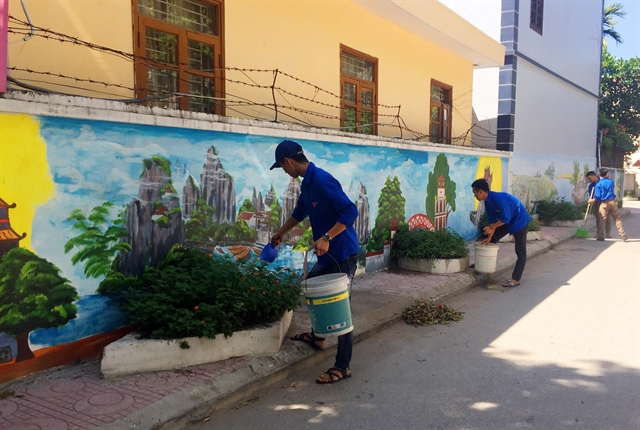More than 60 per cent of all communes in Việt Nam are meeting standards set to become environmentally aware.

Members of the Hồ Chí Minh Communist Youth Union of Hà Nội's Đan Phượng District take care of trees and clean streets as part of the district's new-style rural area building efforts. VNA/VNS Photo Kim Anh
Their efforts are part of a 10-year national programme to build new-style rural areas for the 2010-19 period.
The achievements include farmers raising earthworms (Perionyx excavates) to deal with livestock waste, sorting waste at source, building household wastewater-treatment stations and improving landscape by growing more trees and flowers.
Nguyễn Xuân Hùng, of Hà Nội’s Gia Lâm District, collects 360 tonnes of cow manure from local farmers each month to raise earthworms.
Cow manure is used as food for the worms who then produce manure considered the best type of organic fertiliser for plants. Mature earthworms can also be used as feed for cows, chickens, pigs and fish.
The model has helped reduce cow manure discharge in the district. Data showed that only in Phù Đổng Commune, about 20 tonnes of cow manure is discharged into environment daily.
The model is believed to not only protect environment but also create jobs for local residents.
Hùng said he now earns VNĐ20,000 (US$86 cents) per kilo of earthworm breeding, VNĐ100,000 ($4.3) per kilo of mature earthworm and VNĐ 2,500 ($11 cents) each kilo of organic fertiliser.
In Đan Phượng District, communes met environmental criteria after residents cleaned ponds full of rubbish, improved the water quality to create a space for children swimming as well as growing more trees and flowers along rural roads.
In the central province of Hà Tĩnh, more than 71,000 households are sorting waste at source and about 30,000 households were trained to make organic compost for crop production.
In the northern province of Thái Nguyên, the Sông Công City built a household-wastewater treatment station, covering about 5,000sq.m in 2014. The station treats 750cu.m of wastewater daily on the principle of sedimentation and anaerobic biodegradation. (The degradation of compounds by microorganisms in the absence of oxygen is termed as anaerobic biodegradation.)
The city grows trees, flowers and dug a pond to create a green space for local residents.
The national target programme, initiated by the Government in 2010, has 19 criteria in different aspects, including environmental criteria, aiming to boost the development of rural area across the country.
Shortcomings, solutions
But despite these remarkable achievements, there is still room for improvements.
Once a commune meets the required levels, some feel they have achieved all they need to do, and standards slip.
Some of the 5,543 communes nationwide are letting standards slip, and need to be reminded the importance of environmental sustainability, Vietnam News Agency reported.
Other communes are neglecting their environmental responsibilities and instead focusing on infrastructure investment.
Trần Thị Thành, from the Hà Tĩnh Province’s Environment Protection Department recommended empowering people with the knowledge needed to make sure they were aware of the importance of environmental solutions.
She also said attracting private investment to operate wastewater treatment systems was another solution.
Deputy Minister of Natural Resources and Environment Võ Tuấn Nhân said to fix the situation, the Ministry of Agriculture and Rural Development was asking government to install stricter requirement on tree planting as well as managing wastewater.